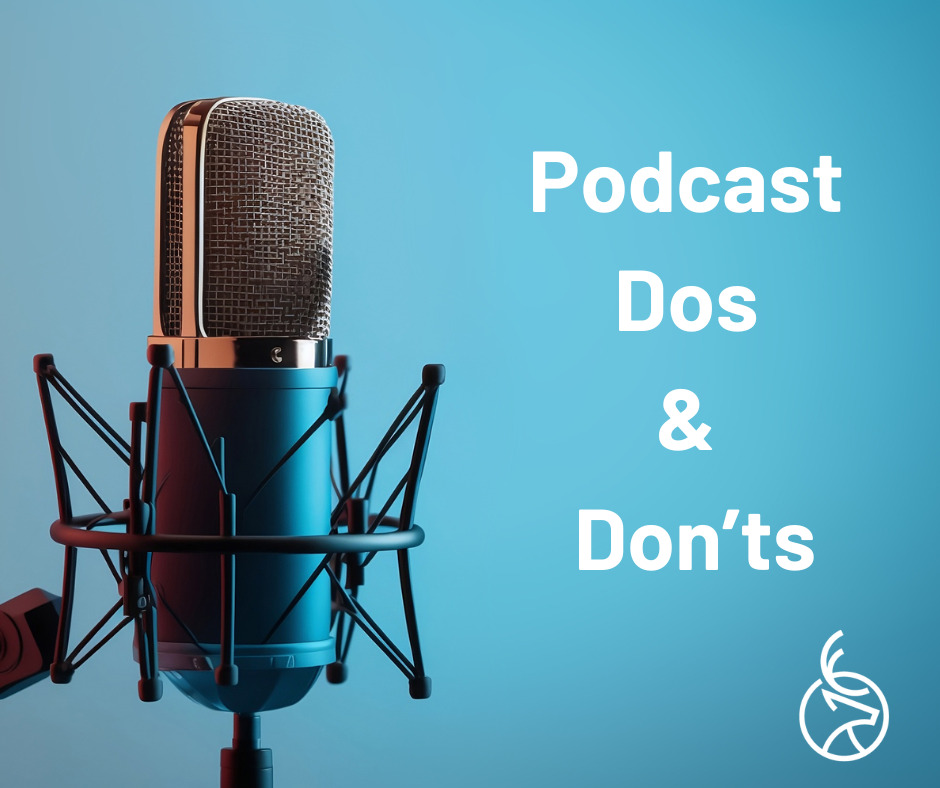How to successfully set up your own podcast in digital health
We recently helped the Access Group’s Health, Support and Care division (HSC) launch their brand new podcast, Redefining Care.

Along the way, we learnt so much about what to consider when starting a podcast and what can help to make a digital health podcast series a success. After working on our first series of #RedefiningCare, we’ve collated some of our top tips for you to consider when launching a podcast. Here are our dos and don’ts when it comes to setting up your own podcast, and ensuring you get the most out of the content you create.
Do:
1. Find your niche
It’s important to know what topics you intend to cover on your podcast from the beginning and identify your target audience. There’s a lot of podcasts out there today, so it’s always good to find your niche and stick with it, which also helps build a more loyal audience going forward. You may think this will make it hard for your podcast to gain engagement initially- but trust us, the more focused the better!
2. Choose the right host
Having a regular host or hosts provides consistency and can be the main reason why listeners connect to a podcast. Selecting the right person to host from the get-go gives a podcast its identity. Your host needs to be well versed on the content covered and be able to confidently speak to experts about the industry. They don’t necessarily need to be experts, but should be curious and informed enough to ask the questions listeners want to hear. Also, when choosing a host, you should pick someone who is able to let the guests shine by letting them lead the conversations while being quick on their feet and able to adapt to any curveballs that may come up during the recording.
3. Have a consistent posting schedule
Audiences like to know when new content will be published, so having a consistent posting schedule is crucial. Frequency is not as important as establishing a regular schedule. You could post weekly, bi-weekly, or even monthly, but if listeners aren’t aware when new episodes are coming out, you may find your audience size diminishing over time.
4. Invest in good tech
Good sound quality is essential. Nowadays most people listen to podcasts through headphones which can pick up on low quality audio more easily, so you want to make sure you’re using the right equipment to create episodes that are up to scratch. Tech doesn’t need to be overly expensive, but having a good quality USB mic, and a pair of headphones to record will help eliminate any background noise which can distract listeners and affect their experience.
4. Repurpose your content
You’ve worked so hard on your podcast, and so why not repurpose it to make sure it can reach as large an audience as possible. You can rework each episode into different formats to help expand its outreach. Some examples of this are utilising graphics and quotes to share on social media, writing up blog posts, or creating content snippets. The opportunities are endless!
Don’t:
1. Use jargon
You shouldn’t assume that listeners have prior knowledge on the topics being covered and therefore providing explanations on key themes and terms where possible is always recommended. Avoid technical terms, blanket statements and use clear language when speaking to guests. If listeners can’t keep up with what’s being discussed, it easy for them to tune out.
2. Make episodes too long
When starting out on a podcast, it’s important to keep episodes short and sweet. Once a podcast is more successful episodes can get longer but, in the beginning, the intention it to engage listeners and make them want more. As a host, try to avoid rambling and though some small talk is fine and encourages a natural flow to conversations, try to get to the key talking points quickly to keep listeners engaged.
3. Stick to the same guests
If every guest comes from a similar working background or role, the content can become predictable, and listeners may stop tuning in on a regular basis. It’s best to have varied interviewees, so that a range of perspectives can be shared and the content is diverse. Not only does this help keep audiences interested, but it also makes it more exciting for the host, as every episode can lead to an entirely different conversation.
4. Record every episode differently
Being consistent with the sound quality of your podcast helps makes episodes more professional, and changes to quality standards can be noticeable to listeners. Using the same equipment to record every time will help to keep audio uniform across all episodes and prevent disparities in quality.
5. Skimp on editing
Good editing helps to give a podcast the polished feel which ensures a positive listener experience. High quality editing and removing any natural mistakes, incorrect facts or awkward moments helps to create a professional and slick product. That being said, it’s easy to over edit – but you should avoid cutting the podcast to the point where it disrupts the natural flow of conversation. At the beginning, investing in the right team and tools to edit a podcast can make or break audience reactions to the content you publish.
Want to start your own podcast but don’t know where to begin? We can help with that! Get in touch with us today to see how we can support in establishing your very own health tech podcast.